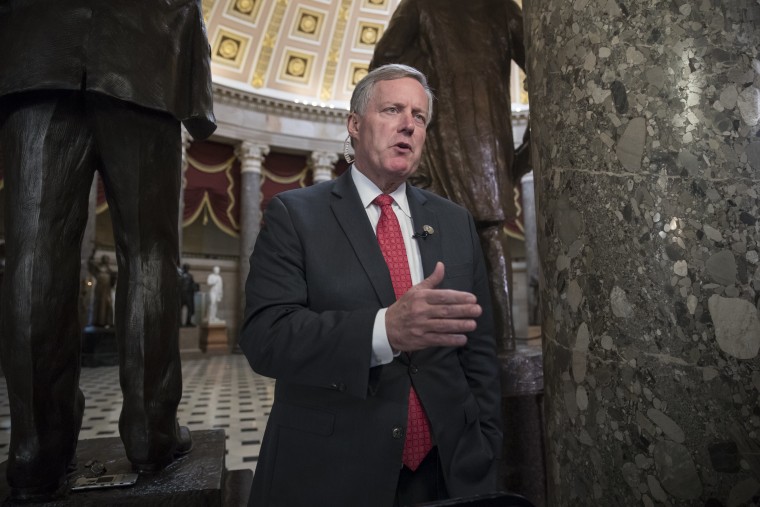WASHINGTON — House Republican leadership put on the table a short-term government funding bill Tuesday night ahead of an end-of-the week deadline to keep the government open.
The proposal, which ignores Democrats' demands for a legislative solution to protect young immigrants known as Dreamers and attempts to further gut Obamacare, appeared unlikely to achieve the support of many Democrats and it’s unclear if it will get the support of enough Republicans.
The measure was presented to Republican rank-and-file members of the House in a closed door meeting Tuesday night to a conference frustrated with funding the government in short-term increments.
The bill, which is the fourth stop-gap bill since the end of the last fiscal year in September, would fund the government at current levels for an additional four weeks, allowing more time for stalled negotiations over the Deferred Action for Childhood Arrivals program, or DACA, to find consensus on government funding for the remaining eight months of the fiscal year.
The bill would extend the children’s health insurance program, CHIP, for an additional six years.
The Republicans' proposal would also suspend the main revenue sources in the Affordable Care Act for up to two years, which would likely further cripple Obamacare. The medical device tax and the so-called Cadillac tax on high-cost health care plans would be delayed for two years, starting in 2018. And the health insurance tax, or HIT, which is loathed by insurance companies, would be suspended for one year starting in 2019.
Many rank-and-file lawmakers left the meeting seemingly willing to go along with the plan but unenthusiastic about voting for yet another short-term measure. Some in the conservative House Freedom Caucus, however, expressed concerns that included a lack of any agreement on defense spending, possibly throwing the entire bill into jeopardy.
“You have to figure out why is the fourth [continuing resolution] going to be any different from the second and the third, and I don’t know that there’s a compelling case for that,” Rep. Mark Meadows, R-N.C., head of the conservative House Freedom Caucus, told reporters.
Meadows said, however, that the Freedom Caucus is under pressure to vote for the measure.
“Obviously we know this is going to come down to a few Republican votes and the number of Freedom Caucus members that are undecided could make the difference on whether we pass it or not,” Meadows added. “So I can tell you we are taking it very seriously.”
Democrats, who have been pushing for an extension of CHIP, will have to decide if they’ll vote in favor of the health insurance program while voting to strip funding for Obamacare.

Rep. Jackie Speier, D-Calif., said she won’t support it. “I’m not going to unwind Obamacare as part of continuing to keep the government open for two or three weeks,” Speier said.
If the House passes it, the funding bill would then go to the Senate where its fate is even less certain. Republicans there need the support of nine Democrats to pass any funding measure.
“We’re always in a place where we have zero confidence in the senate so I think what we’re trying to do is spoon feed them with just the three major things: the delay on the medical device tax [and] the insurance tax, with the six year re-authorization of CHIP,” Rep. Mark Walker, R-N.C., and head of the Republican Study Committee, said.
Further complicating negotiations is DACA, the executive branch program to defer deportation for immigrants brought to the U.S. illegally as children. Many Democrats want a deal to enshrine the program into law before Friday’s government funding deadline, but President Donald Trump’s derogatory comments about African nations and Haiti and his opposition to the one proposal that’s on the table by Sens. Lindsey Graham, R-S.C., and Dick Durbin, D-Ill., have thrown a large wrench into negotiations.
Graham said a deal on DACA is necessary for ongoing, separate talks on long-term government funding levels, including for defense.
“If you think the Democratic Party is going to give us all we want on defense and one day in March deal with the DACA kids, that is about naive as I've ever heard,” Graham said.
